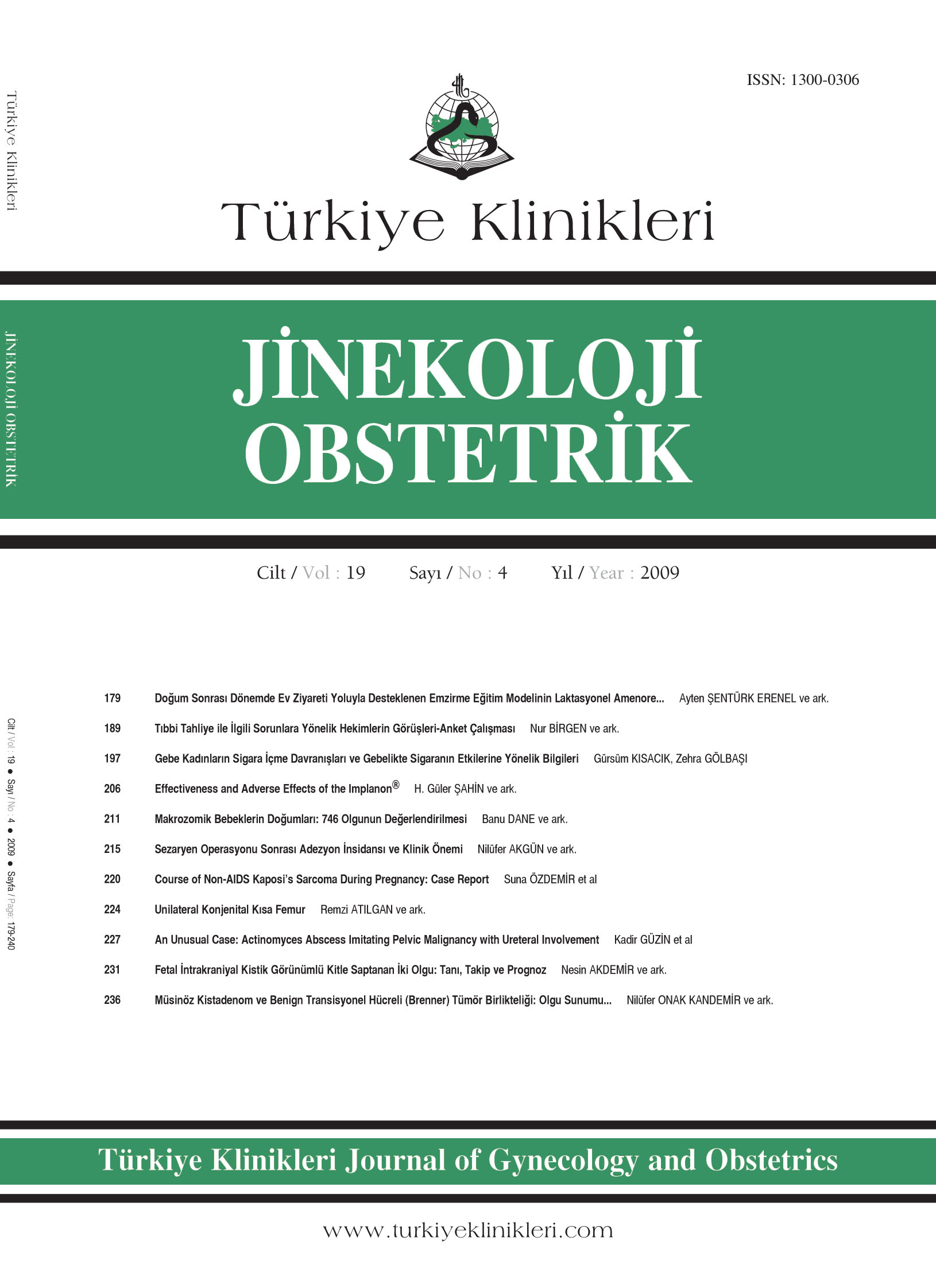Open Access
Peer Reviewed
ORIGINAL RESEARCH
3238 Viewed1191 Downloaded
Obstetricians Opinion About Problems of Termination of Pregnancy
Tıbbi Tahliye ile İlgili Sorunlara Yönelik Hekimlerin Görüşleri-Anket Çalışması
Turkiye Klinikleri J Gynecol Obst. 2009;19(4):189-96
Article Language: TR
Copyright Ⓒ 2025 by Türkiye Klinikleri. This is an open access article under the CC BY-NC-ND license (http://creativecommons.org/licenses/by-nc-nd/4.0/)
ÖZET
Amaç: Tıbbi tahliye ile ilgili yasalarda bulunması gereken hususlar, tıbbi tahliyenin organizasyonu ve tıbbi tahliye kavramı içine girmesi öngörülen anomalilerin belirlenmesine yardımcı olmaktır. Gereç ve Yöntemler: Tıbbi tahliye ile ilgili 36 soruyu içeren bir anket hazırlandı. Hazırlanan anket perinatoloji ile ilgili iki önemli ulusal kongreye katılan 100 doktora sunuldu. Bulgular: Hekimlerin %44'ünün Türkiye'de tıbbi tahliye ile ilgili yasal düzenlemeleri bildiği ve %42.1'inin çalıştıkları kurumlarda Tıbbi Tahliye Kurulları'nın bulunduğu saptandı. Katılımcıların %54'ü kurumların kendi bünyelerinde, %32'si ise bölgesel Tıbbi Tahliye Kurulları oluşturulmasını önerdi. Tıbbi tahliye uygulamalarında gebelik haftası sınırı olması gerektiğini savunanlar %27, olmamasını önereler ise %23 oranlarında belirlendi. Yaşamla bağdaşmayan, doğum sonrası tedavisi olmayan veya prognozu kötü olan ve mental retardasyona neden olan anomaliler sırasıyla %93, 78, 79 ve 71 oranlarında tıbbi tahliye gerekçeleri olarak belirtildi. Doğum sonrası prognozu belirsiz olan ve yaşamı zorlaştıracak fiziksel bozukluklara neden olan anomaliler ise sırasıyla %18 ve 16 oranlarında tıbbi tahliye gerekçeleri olarak gösterildi. Sonuç: Tıbbi tahliye gerekçelerinin ana kategoriler şeklinde belirlenmesi, ağır fetal anomalilerin tıbbi tahliye gerekçesi olabileceği ve tıbbi tahliye uygulayan tüm sağlık kuruluşlarında Tıbbi Tahliye Kurulları oluşturulması gerektiği ortaya konuldu.
Amaç: Tıbbi tahliye ile ilgili yasalarda bulunması gereken hususlar, tıbbi tahliyenin organizasyonu ve tıbbi tahliye kavramı içine girmesi öngörülen anomalilerin belirlenmesine yardımcı olmaktır. Gereç ve Yöntemler: Tıbbi tahliye ile ilgili 36 soruyu içeren bir anket hazırlandı. Hazırlanan anket perinatoloji ile ilgili iki önemli ulusal kongreye katılan 100 doktora sunuldu. Bulgular: Hekimlerin %44'ünün Türkiye'de tıbbi tahliye ile ilgili yasal düzenlemeleri bildiği ve %42.1'inin çalıştıkları kurumlarda Tıbbi Tahliye Kurulları'nın bulunduğu saptandı. Katılımcıların %54'ü kurumların kendi bünyelerinde, %32'si ise bölgesel Tıbbi Tahliye Kurulları oluşturulmasını önerdi. Tıbbi tahliye uygulamalarında gebelik haftası sınırı olması gerektiğini savunanlar %27, olmamasını önereler ise %23 oranlarında belirlendi. Yaşamla bağdaşmayan, doğum sonrası tedavisi olmayan veya prognozu kötü olan ve mental retardasyona neden olan anomaliler sırasıyla %93, 78, 79 ve 71 oranlarında tıbbi tahliye gerekçeleri olarak belirtildi. Doğum sonrası prognozu belirsiz olan ve yaşamı zorlaştıracak fiziksel bozukluklara neden olan anomaliler ise sırasıyla %18 ve 16 oranlarında tıbbi tahliye gerekçeleri olarak gösterildi. Sonuç: Tıbbi tahliye gerekçelerinin ana kategoriler şeklinde belirlenmesi, ağır fetal anomalilerin tıbbi tahliye gerekçesi olabileceği ve tıbbi tahliye uygulayan tüm sağlık kuruluşlarında Tıbbi Tahliye Kurulları oluşturulması gerektiği ortaya konuldu.
ABSTRACT
Objective: To assist to assess the particular subjects that should be in abortion law, the organization of late termination of pregnancy, and the fetal anomalies that should be covered under the concept of late termination. Material and Methods: A questionnaire composed of 36 questions that sought for clinicians' preferences for late termination was delivered to 100 medical doctors during the two important national congresses of perinatology. Results: 44% of the doctors were aware of the legislation about late termination and 42.1% had late termination council in their institutions. 54% suggested that late termination council should be built in every institution whereas 32% suggested regional councils. 27% suggested that there should be gestational limit in late termination and 23% opposed this idea. The justifications of late termination were determined as malformations that do not get along with life (93%), that cannot be treated after birth (78%), that have poor prognosis (79%) and mental retardation (71%). 18% of the doctors stated that the anomalies which have doubtful prognosis should be terminated and 16% stated that the anomalies which cause severe physical impairment should be terminated. Conclusion: The justifications for termination of pregnancy should be in categories, severe fetal abnormalities can be accepted as an indication for late termination of pregnancy and the institutions that deal with late termination of pregnancy should have their own late termination councils.
Objective: To assist to assess the particular subjects that should be in abortion law, the organization of late termination of pregnancy, and the fetal anomalies that should be covered under the concept of late termination. Material and Methods: A questionnaire composed of 36 questions that sought for clinicians' preferences for late termination was delivered to 100 medical doctors during the two important national congresses of perinatology. Results: 44% of the doctors were aware of the legislation about late termination and 42.1% had late termination council in their institutions. 54% suggested that late termination council should be built in every institution whereas 32% suggested regional councils. 27% suggested that there should be gestational limit in late termination and 23% opposed this idea. The justifications of late termination were determined as malformations that do not get along with life (93%), that cannot be treated after birth (78%), that have poor prognosis (79%) and mental retardation (71%). 18% of the doctors stated that the anomalies which have doubtful prognosis should be terminated and 16% stated that the anomalies which cause severe physical impairment should be terminated. Conclusion: The justifications for termination of pregnancy should be in categories, severe fetal abnormalities can be accepted as an indication for late termination of pregnancy and the institutions that deal with late termination of pregnancy should have their own late termination councils.
MENU
POPULAR ARTICLES
MOST DOWNLOADED ARTICLES





This journal is licensed under a Creative Commons Attribution-NonCommercial-NoDerivatives 4.0 International License.










